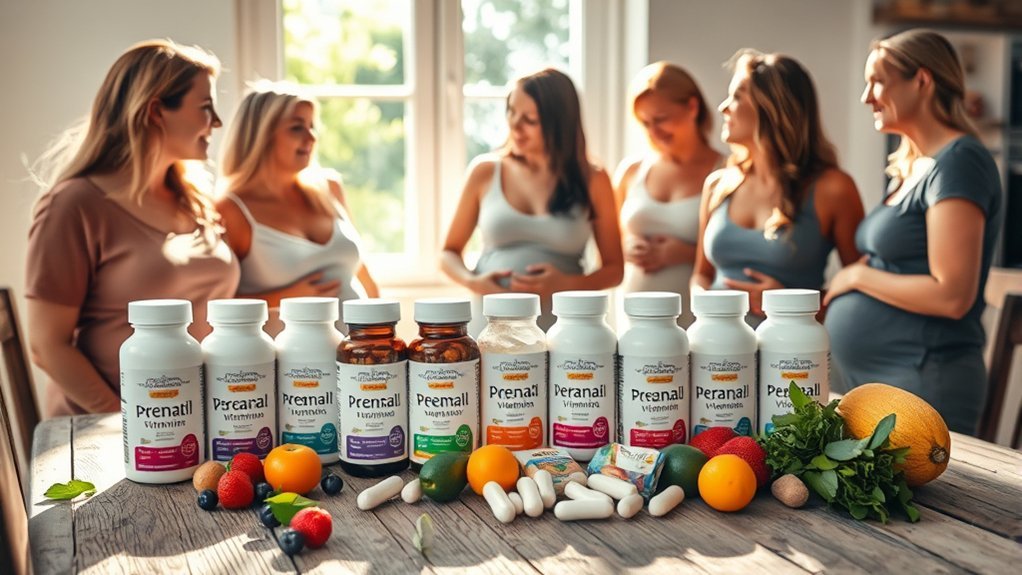Many people think prenatal vitamins are only necessary for pregnant women, but that’s a misconception. These vitamins provide essential nutrients that benefit women’s health at various life stages, including preconception and breastfeeding. However, understanding the right dosage and the role of a healthy diet is vital. Are you aware of the potential risks of overdosing or relying solely on supplements? Let’s explore these myths and the facts that can guide you to make informed choices.
Understanding Prenatal Vitamins: What They Are and Why They Matter

Prenatal vitamins are essential supplements designed to support the health of both expectant mothers and their developing babies.
These vitamins typically contain key nutrients like folic acid, iron, calcium, and DHA, which play critical roles in fetal development.
Prenatal vitamins are rich in essential nutrients like folic acid, iron, calcium, and DHA, crucial for fetal development.
Folic acid, for instance, helps prevent neural tube defects, while iron supports increased blood volume during pregnancy.
Calcium is important for bone development, and DHA supports brain growth.
Starting prenatal vitamins before conception and continuing through pregnancy can enhance maternal health and reduce risks.
It’s important to consult your healthcare provider for personalized recommendations, as they can help determine the right dosage and formulation based on your individual needs.
Prioritizing these nutrients can make a significant difference for you and your baby.
Myth #1: Prenatal Vitamins Are Only for Women Who Are Pregnant

Many people believe that prenatal vitamins are only necessary for women who are already pregnant, but this isn’t entirely accurate.
In fact, these vitamins can benefit women at various stages of life, especially if you’re planning to conceive. Here are three reasons why you might consider taking prenatal vitamins even before pregnancy:
- Nutritional Support: They provide essential nutrients that may be lacking in your diet, like folic acid, which helps prevent neural tube defects.
- Preparation for Pregnancy: Starting prenatal vitamins early can help guarantee your body is ready for the demands of pregnancy.
- Overall Health: They can also support your general well-being during menstruation and other life stages.
Fact #1: Essential Nutrients for Every Stage of Pregnancy

Understanding the key vitamins required during pregnancy is essential for your baby’s development.
Nutrients like folic acid, iron, and calcium play significant roles at every stage, from conception to birth.
Key Vitamins Required
During pregnancy, your body requires a variety of essential nutrients to support both your health and your baby’s development.
Here are three key vitamins you shouldn’t overlook:
- Folic Acid: Critical for reducing the risk of neural tube defects, it’s recommended to consume at least 600 micrograms daily.
- Iron: Important for increasing blood volume and preventing anemia, aim for around 27 milligrams daily to support your growing needs.
- Calcium: Crucial for developing your baby’s bones and teeth, you should get about 1,000 milligrams daily to maintain your own bone health as well.
Incorporating these vitamins into your prenatal routine can enhance your pregnancy experience and guarantee both you and your baby are thriving.
Impact on Fetal Development
The nutrients you consume throughout your pregnancy play an indispensable role in your baby’s development at every stage. Folate, for example, helps prevent neural tube defects, while iron supports proper blood flow and oxygen transport.
Calcium is essential for developing strong bones and teeth, and DHA, an omega-3 fatty acid, contributes to brain and eye development.
During the first trimester, these nutrients help establish significant systems, while their importance continues throughout pregnancy as your baby grows.
Deficiencies in these indispensable vitamins and minerals can lead to complications, affecting both your health and your baby’s development.
Myth #2: More Is Always Better: Overdosing on Prenatal Vitamins
Many people believe that taking more prenatal vitamins will provide additional benefits, but this isn’t true.
Overdosing on certain vitamins and minerals can lead to serious health risks for both you and your baby.
It’s essential to stick to the recommended daily allowance to guarantee a safe and healthy pregnancy.
Risks of Excess Dosage
While it’s easy to assume that taking more prenatal vitamins will enhance your baby’s health, this belief can be misleading and even dangerous. Overdosing on certain vitamins can lead to serious health risks for both you and your baby.
Here are three potential dangers:
- Vitamin A Toxicity: Excessive intake can cause birth defects and liver damage.
- Iron Overload: Too much iron can lead to gastrointestinal issues and increased risk of infections.
- Hypercalcemia: High calcium levels can harm your baby’s heart and kidneys.
It’s crucial to stick to recommended dosages.
Always consult your healthcare provider before making changes to your vitamin regimen to guarantee both you and your baby stay healthy.
Recommended Daily Allowance
What makes you think that taking more prenatal vitamins will benefit your health and your baby’s? Many believe that higher doses equate to better outcomes, but that’s a myth. Overdosing on certain vitamins can lead to adverse effects. For example, excessive vitamin A can cause birth defects, while too much iron may lead to gastrointestinal issues. It’s essential to stick to the recommended daily allowance (RDA) for your specific needs.
| Vitamin | Recommended Daily Allowance (RDA) | Risks of Overdose |
|---|---|---|
| Folic Acid | 600 mcg | Neurological issues |
| Iron | 27 mg | Constipation, nausea |
| Calcium | 1,000 mg | Kidney stones |
| Vitamin D | 600 IU | Hypercalcemia |
| Vitamin A | 770 mcg | Birth defects |
Always consult your healthcare provider before making changes.
Fact #2: Recommended Dosages and Safe Levels
When it comes to prenatal vitamins, understanding the recommended dosages and safe levels is crucial for both your health and your baby’s development.
Taking the right amounts can optimize outcomes while avoiding potential risks. Here are three key points to take into account:
- Folic Acid: Aim for 600 micrograms daily to help prevent neural tube defects.
- Iron: A dosage of 27 milligrams is recommended to support increased blood volume and prevent anemia.
- Calcium: You should get about 1,000 milligrams daily to help with your baby’s bone development.
Always consult your healthcare provider to tailor these recommendations to your specific needs.
Proper dosages guarantee you receive the necessary nutrients without exceeding safe levels, promoting a healthier pregnancy.
Myth #3: All Prenatal Vitamins Are Created Equal
Not all prenatal vitamins are made the same; ingredient quality can vary greatly.
You’ll find differences in dosages and formulations tailored to specific needs, which can affect both you and your baby’s health.
Choosing the right prenatal vitamin is vital, so understanding these variations is essential.
Ingredient Quality Variations
Many expectant mothers believe that all prenatal vitamins offer the same benefits, but this couldn’t be further from the truth.
Ingredient quality can vary greatly, impacting both absorption and effectiveness. Here are three factors to take into account when evaluating prenatal vitamins:
- Source of Ingredients: Some brands use synthetic forms of nutrients, while others opt for natural sources, which can affect bioavailability.
- Purity and Additives: Cheaper vitamins may contain fillers, artificial colors, or allergens that could be harmful or unnecessary.
- Manufacturing Standards: Look for brands that adhere to Good Manufacturing Practices (GMP) to guarantee quality and safety.
Dosage Differences Matter
Dosage differences in prenatal vitamins can greatly impact your health during pregnancy. Not all prenatal vitamins contain the same levels of essential nutrients, which means some may not meet your specific needs.
For instance, the recommended daily allowance for folic acid is 600 micrograms, but some vitamins may contain less. Inadequate folic acid can increase the risk of neural tube defects. Similarly, iron levels vary widely; you might need higher doses if you’re anemic.
It’s essential to read labels carefully and consult your healthcare provider to guarantee you’re taking a formula that aligns with your unique health requirements. Remember, higher doses aren’t always better, so finding the right balance is key to supporting both you and your developing baby.
Targeted Nutrient Formulations
While it might seem that all prenatal vitamins offer the same benefits, the truth is that targeted nutrient formulations are vital for addressing the specific needs of pregnant individuals.
Different formulations cater to various aspects of pregnancy, ensuring you receive the right nutrients at the right levels. Here are three key factors to take into account:
- Folic Acid: Essential for preventing neural tube defects, the dosage varies considerably between brands.
- Iron: Important for preventing anemia, some formulations include higher iron levels for those with increased needs.
- DHA: Omega-3 fatty acids support fetal brain development; not all prenatal vitamins contain adequate amounts.
Choosing the right formulation means better support for your pregnancy journey and your baby’s health.
Fact #3: Choosing the Right Prenatal Vitamin for Your Needs
How can you guarantee you’re choosing the right prenatal vitamin for your unique needs? Start by evaluating your dietary habits and any specific health concerns. Some vitamins are better suited for certain conditions, like anemia or morning sickness. Here’s a simple guide to help you:
| Nutrient | Importance | Sources |
|---|---|---|
| Folic Acid | Reduces neural tube defects | Leafy greens, fortified cereals |
| Iron | Supports increased blood volume | Red meat, beans |
| DHA | Aids fetal brain development | Fatty fish, algae |
Consult your healthcare provider to confirm you select a vitamin that complements your individual health needs. They can help tailor recommendations based on your lifestyle and medical history.
Myth #4: Prenatal Vitamins Can Replace a Healthy Diet
Many expectant mothers mistakenly believe that taking prenatal vitamins alone can fulfill all their nutritional needs, but this is far from the truth.
While prenatal vitamins provide essential nutrients, they can’t replace the benefits of a balanced diet. Here are three reasons why:
Prenatal vitamins are essential, but they can’t replace the vital benefits of a balanced diet.
- Whole Foods: Nutrients in food work synergistically; vitamins and minerals in fruits, vegetables, and whole grains offer benefits that supplements can’t replicate.
- Fiber: A healthy diet provides fiber, vital for digestion and preventing constipation, which prenatal vitamins lack.
- Additional Nutrients: Foods contain antioxidants and phytochemicals that support overall health, beyond what prenatal vitamins offer.
Relying solely on supplements can lead to nutrient gaps and poor health outcomes for you and your baby.
Prioritize a nutritious diet alongside your prenatal vitamins.
Fact #4: The Importance of Nutrition Alongside Supplements
Nutrition plays a crucial role in supporting a healthy pregnancy, and relying solely on prenatal vitamins isn’t enough to meet your needs. While these supplements provide essential nutrients like folic acid and iron, they can’t replace the diverse benefits of whole foods.
A balanced diet rich in fruits, vegetables, whole grains, and lean proteins offers essential nutrients that work synergistically to support both you and your developing baby. Studies show that dietary patterns, such as the Mediterranean diet, can reduce complications and promote healthy fetal development.
Additionally, whole foods provide fiber and antioxidants that supplements may lack. So, don’t underestimate the power of nutrition; combine a healthy diet with your prenatal vitamins for peak health during pregnancy.
Myth #5: Prenatal Vitamins Are Only Necessary in the First Trimester
While some believe that prenatal vitamins are only essential during the first trimester, this myth can overlook the ongoing nutritional needs throughout your entire pregnancy. Your body requires a consistent supply of nutrients for the health of both you and your developing baby.
Prenatal vitamins are crucial throughout pregnancy, ensuring both mother and baby receive essential nutrients for optimal health.
Here are three reasons why continuing prenatal vitamins is vital:
- Supports fetal growth: Essential nutrients like DHA and iron play significant roles in your baby’s brain development and blood production throughout all trimesters.
- Prevents deficiencies: As your pregnancy progresses, your body’s nutritional demands increase. Prenatal vitamins help meet these needs.
- Promotes maternal health: Ongoing supplementation can help you maintain your health, energy levels, and well-being during pregnancy and postpartum.
Don’t underestimate the importance of prenatal vitamins beyond the first trimester.
Frequently Asked Questions
Can Men Take Prenatal Vitamins for Their Health?
Yes, men can take prenatal vitamins, but it’s not necessary. They contain nutrients beneficial for overall health. However, focusing on a balanced diet tailored to your specific needs is more effective for ideal wellness.
Are There Side Effects Associated With Prenatal Vitamins?
Sure, you can experience side effects from prenatal vitamins, like nausea or constipation. But hey, who doesn’t love a little gastrointestinal drama? Just remember to consult your doctor if you’re feeling more than a tad uncomfortable!
How Long Should I Take Prenatal Vitamins After Pregnancy?
You should take prenatal vitamins for at least six months after pregnancy, especially if you’re breastfeeding. This helps replenish nutrients and supports your recovery. Always consult your healthcare provider for personalized recommendations based on your needs.
Do Prenatal Vitamins Affect Fertility?
Prenatal vitamins can support fertility by providing essential nutrients like folic acid, which promotes healthy ovulation and embryo development. While they won’t guarantee pregnancy, they help create an ideal environment for conception.
Can I Get All Nutrients From Food Alone?
You can get many nutrients from food alone, but it’s challenging to meet all your needs, especially during pregnancy. A balanced diet is essential, but supplements can help fill any gaps for ideal health.
Conclusion
So, if you thought prenatal vitamins were just a trendy accessory for pregnant women, think again! These essential nutrients are like your health’s best friends, hanging around even before you’re expecting. And while it might be tempting to guzzle them like candy, remember: more isn’t always merrier—overdosing can turn you into a health disaster waiting to happen. Embrace a balanced diet alongside these vitamins, and you’ll be on your way to supporting both your health and your future little one’s!
